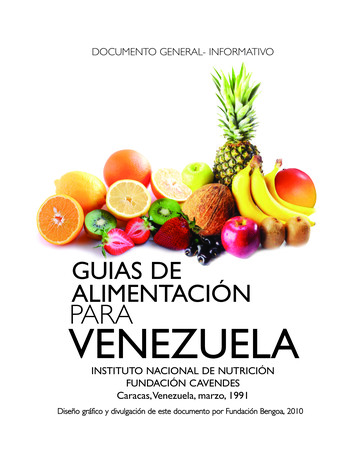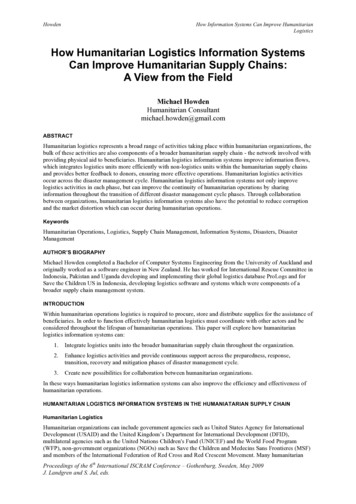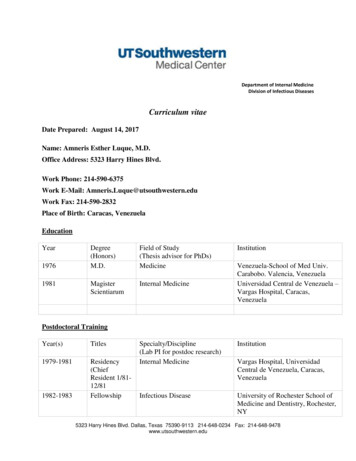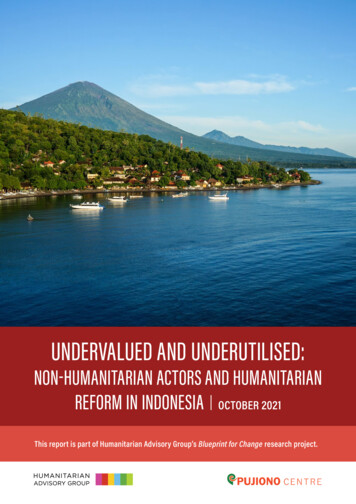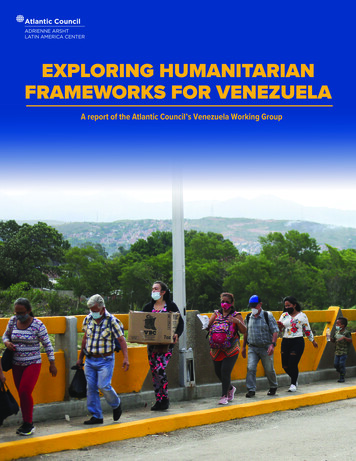
Transcription
EXPLORING HUMANITARIAN FRAMEWORKS FOR VENEZUELAAtlantic CouncilADRIENNE ARSHTLATIN AMERICA CENTEREXPLORING HUMANITARIANFRAMEWORKS FOR VENEZUELAA report of the Atlantic Council’s Venezuela Working Group1
EXPLORING HUMANITARIAN FRAMEWORKS FOR VENEZUELAAtlantic CouncilADRIENNE ARSHTLATIN AMERICA CENTERThe Adrienne Arsht Latin America Center (AALAC) broadens understanding of regional transformations through high-impact work thatshapes the conversation among policymakers, the business community, civil society, and media. Founded in 2013, the center focuseson Latin America’s strategic role in a global context, with a priorityon pressing political, economic, and social issues that will definethe trajectory of the region now and in the years ahead. Select linesof programming include: China in Latin America; Venezuela’s crisis;Mexico’s US and global ties; Colombia’s future; a changing Brazil;Central American prosperity; combatting disinformation; shiftingtrade patterns and modernization of supply chains; charting a postCOVID future; Caribbean development; and leveraging energyresources. Jason Marczak serves as center director.Cover: People, permitted for humanitarian reasons, cross the Simon Bolivar Internationalbridge from Cucuta, Colombia, after it was reopened, as seen from in San Antonio delTachira, Venezuela. Picture taken October 4, 2021. REUTERS/Carlos Eduardo RamirezISBN-13: 978-1-61977-218-2Copyright: March 2022 The Atlantic Council of the United States. All rights reserved. Nopart of this publication may be reproduced or transmitted in any form or by anymeans without permission in writing from the Atlantic Council, except in thecase of brief quotations in news articles, critical articles, or reviews. Please directinquiries to:Atlantic Council1030 15th Street NW, 12th FloorWashington, DC 20005For more information, please visitwww.AtlanticCouncil.org.2
EXPLORING HUMANITARIAN FRAMEWORKS FOR VENEZUELAINTRODUCTIONThe humanitarian crisis in Venezuela reached unprecedented levels in 2021. In state-dependent and oil-dependent Venezuela, mismanagement and corruptionin the Nicolás Maduro administration, as well as the loss inincome from oil sales, has accelerated the existing economiccrisis and deepened humanitarian suffering. According to thelatest National Survey of Living Conditions (ENCOVI), 95 percent of Venezuela’s twenty-eight million citizens live in poverty, while 77 percent live in extreme poverty—a 10-percentincrease from last year. Despite an increasing dollarizationof its economy and multiple currency reconversions by theMaduro administration, Venezuela’s annual inflation reached1,743 percent.of an oil-funded program is the continued presence of compliant, accountable, and transparent Western firms in theVenezuelan oil sector. Providing mechanisms for Western andallied operators to remain in Venezuela can also help to maintain and rebuild critical infrastructure for Venezuela’s longterm economic development. In the short term, an oil-fundedmechanism could help European gas operators continue supplying natural gas inside Venezuela, guaranteeing reliableelectricity, cooking gas, and fuel for medical and goods delivery for the local population.Before they were paused by Maduro following the extradition of Alex Saab to the United States, the Norway-mediatednegotiations between the Venezuelan democratic platformand Maduro representatives in Mexico City offered an opportunity to build political agreements necessary for an oil-fundedhumanitarian framework.2 The negotiations are not a permanent space for reaching agreements, but the trust that canbe generated among political factions can unlock the political support that a well-structured, transparent, and effectivehumanitarian mechanism would require.The health and economic effects of the coronavirus pandemic, compounded by nationwide fuel shortages, continueto worsen the country’s multidimensional crisis, especiallyfor Venezuelans living off a 2.50 minimum monthly wage.According to UNICEF data collected between 2019 and 2020,32 percent of Venezuelan households are food insufficient,40 percent of households have recurrent interruptions inwater service, 25 percent of households do not have sustainable access to potable water, the under-five mortality rate is24.2 per thousand live births, and maternal deaths have ballooned to such alarming numbers that statistics are no longer publicly disclosed.1 Amid such suffering, almost six millionVenezuelans have fled the country since 2015.To date, two public efforts by separate entities have proposedoil-funded humanitarian frameworks leveraging Venezuela’scrude-oil proceeds to purchase aid. Both proposals attemptedto mold frameworks for Venezuela taking into account lessons learned from the failed UN-managed Oil-for-Food program in Iraq, another heavily sanctioned country with corruption-related challenges. The first proposal originates from Oilfor Venezuela, a foundation led by Venezuelan economistFrancisco Rodríguez. The second originates from the BostonGroup, a nonpartisan policy platform with members acrossVenezuela’s political spectrum, oil-industry experts, and civil-society groups.Efforts by the international community to alleviate Venezuela’shumanitarian crisis—namely, the United Nations HumanitarianResponse Plan (HRP)—have been commendable. However,contributions are lacking in both speed and size. Only 29 percent of the 700 million allocated for 2021 under the HRP hasbeen executed (the execution rate was 24 percent in 2020and 34 percent in 2019). Even a full execution of the allocated funds would be insufficient for a crisis that humanitarian experts say requires multiple billions of dollars in humanitarian aid.This policy brief is an effort by the Atlantic Council’s VenezuelaWorking Group (VWG) to analyze the two existing oil-fundedhumanitarian proposals on Venezuela, and provide recommendations for future humanitarian proposals’ governancestructure, financing mechanisms, transparency controls, political agreements, legal requirements, and multilateral participation to achieve the most optimal possible outcome for theVenezuelan people.Into this gap enter oil-funded humanitarian frameworks. Suchframeworks could provide sustained humanitarian relief without requiring the time-consuming and bureaucratic allocationof funds from the United Nations (UN). An important benefitNote from the VWG: The VWG and the Atlantic Council do not seek to sponsor or promote any of the humanitarian programs and proposals under study. The VWG is aware of other private efforts to devise and promote oil-funded frameworks for Venezuela and restore fuel swaps, but for this publication, the VWG considered only the two public humanitarianproposals. As part of this process, the VWG held multiple meetings and consultations with the US government, membersof Venezuela’s democratic opposition, international and multilateral organizations, and private-sector actors in Venezuela.The authors also note that further analysis is required, especially surrounding the nuances of international humanitarianagencies’ and nongovernmental organizations’ administration and distribution of humanitarian aid in Venezuela. Thisanalysis will be considered for future VWG programming.3
EXPLORING HUMANITARIAN FRAMEWORKS FOR VENEZUELAWHY THE UNITED NATIONS OIL-FOR-FOODPROGRAM IN IRAQ SHOULD NOT BE REPLICATED:LESSONS FOR VENEZUELAIn 1995, the adverse humanitarian effects of the UN SecurityCouncil (UNSC) sanctions on Iraq led to the implementationof exceptions to authorize oil exports to fund humanitarianaid, particularly food, in a program known as Oil-for-Food. The program was too dependent on the government ofThe implementation of the Oil-for-Food Programme in Iraqwas based on the UNSC’s authority.3 For that purpose, afteryears of negotiations, the UNSC and Saddam Hussein’s government signed a memorandum of understanding (MOU) in1996. The two main components of the MOU were that theUNSC would oversee the oil imports, procurement of goodsto satisfy humanitarian needs, and the distribution of thosegoods; and that the Iraqi government would conduct all thetransactions related to oil purchase agreements, procurement, and distribution.4 The UN-executed oversight mechanisms lacked enforce-Iraq, which had incentives to increase political support bydistributing economic gains through the illicit rerouting ofresources.ment capacity against the Iraqi government’s opportunistic and illicit behaviors. As a result, the program’s accountability was flawed, even when the MOU establishedsophisticated oversight institutions on paper. The tasks that the UN assumed surpassed its institu-tional capabilities, and revealed inconsistent procurement practices.10 The Iraq experience demonstrated thatthe humanitarian intervention of international organizations could fail due to the limited oversight and enforcement capacity of those organizations.11According to the UN, some 3.4 “billion barrels of Iraqi oil valued at about 65 billion were exported under the Programbetween December 1996 and 20 March 2003. Of thisamount, 72 per cent of the total was allocated towards humanitarian needs nationwide after December 2000 ( ) about 31billion worth of humanitarian supplies and equipment weredelivered to Iraq under the Oil-for-Food Program between20 March 1997 and 21 November 2003, including 1.6 billionworth of oil industry spare parts and equipment.”5 The program was conceived as temporary relief, butlasted almost eight years. This overextended timeline fora program designed with shorter time horizons allowed forincreasing governance challenges, the gradual weakeningof the program’s oversight mechanisms, and graft. The pressure to alleviate the humanitarian relief createdincentives to tolerate the program’s failures as the “lesserevil.”Since 2004, investigations revealed fraudulent schemeswithin the program that boosted corruption in Iraq and abroad.The Independent Inquiry Committee (IIC), appointed in 2004by then UN Secretary-General Kofi Annan, conducted anindependent investigation, which concluded that the Iraqigovernment “manipulated the Program to dispense contractsbased on political preferences and deliver illicit payment fromcompanies that obtained oil and humanitarian goods contracts.”6 The estimate of total illicit income—including oil surcharges and humanitarian kickbacks—was 1.8 billion, plusbillions of dollars smuggled in oil and humanitarian goodsthat were rerouted.7 Despite those deviations, the Oil-forFood Programme had positive—but still limited—humanitarian impacts. While exact numbers are unavailable, a 2005 IICreport concluded the program helped to mitigate the severefood crisis in Iraq, especially during the 1999–2001 drought.8Based on this experience, any proposal for Venezuela thatleverages oil revenues to purchase humanitarian aid shouldconsider these main guidelines. Humanitarian programs require complex political nego-tiations. The Iraqi government initially rejected the implementation of the humanitarian program, calling it a violation of Iraq’s sovereignty. After years of negotiations, in1995, Iraq finally agreed to implement the program. In theVenezuela case, it is necessary to consider the incentivesof the different stakeholders related to the Venezuela program, mainly the Maduro administration and the interimgovernment. While US sanctions routinely contain humanitarianEven though the roots of the program’s pitfalls are varied and long-standing, including the systemic corruption inIraq, our analysis identifies the following five design failuresthat created incentives for rent-seeking behaviors and illicitpayments.9exemptions for basic food or medical transfers, such asin the case of Cuba, an additional exemption would berequired in an oil-for-food context given that US-governedactors would be engaging with the Maduro administration.12 From that perspective, any humanitarian framework for Venezuela should be part of a broader humanitarian strategy, and not simply part of private-public4
EXPLORING HUMANITARIAN FRAMEWORKS FOR VENEZUELApartnerships. Private-public partnerships are designedexclusively on economic incentives, while humanitarianprograms should be based on four basic principles thatare not economic driven: humanitarian perspective, impartiality, neutrality, and independence. The recent failures ofsome public-private agreements to implement oil-for-foodprograms in Venezuela demonstrate the relevance of thehumanitarian framework.were paid in kind with crude oil, they have received nocompensation during the last twelve months due to thesanctions imposed on the oil sector. Should the Westernoperators of natural-gas projects continue to be bannedfrom receiving in-kind debt payments for past and ongoingnatural-gas output, this could lead to the shutdown of theoperations. Shuttered operations would have significanthumanitarian consequences, such as a lack of cooking gasor domestic fuel. Given Maduro’s sanctioned administration, any human-itarian framework will require special arrangementsbetween Maduro and the US-backed democratic forcesto overcome legal and transparency hurdles. Otherwise,the Maduro administration would seize any opportunityfor illicit behavior in the implementation of a humanitarianprogram.13The Iraq experience shows that to avoid incentives for opportunistic or corrupt behaviors, any humanitarian frameworkfor Venezuela involving oil should consider the following: theduties that derive from international humanitarian law; the constraints derived from Maduro’s mismanagement and corruption, and international recognition of the interim government;the design of a simple and specific humanitarian program witha narrow scope; and the limited capacity of international organizations to assume broad oversight duties. The failures of the Iraq program can be explained, in part,by its eight-year duration despite evidence of stakeholders’ malpractice. Humanitarian programs should bedesigned as temporary mechanisms with an incremental scope, subject to scrutiny and conditional renewal.Therefore, they should have specific content that allowsfor a gradual expansion as the program’s capabilities arebuilt.Note from the VWG on next section: In considering the analysis of the two humanitarian proposals below, the readershould note that any proposal design should have at least fourcharacteristics, including the US government, the Maduro administration, and the In the Venezuela case, there is another difference: theVenezuelan democratic opposition must be parties to theagreement;crisis has not been addressed by the UNSC. The UNSCadopted the Iraq sanctions program, but Venezuelan’s wasadopted by the US government. Therefore, any programaimed to allow oil sales in the United States or as compensation to Western operators—currently prohibitedby sanctions—should be authorized by the US TreasuryDepartment Office of Foreign Assets Control (OFAC).The involvement of an international organization is notnecessary to authorize prohibited transactions, althoughit could improve the program’s accountability. the Maduro administration must have incentives to participate, and has to be an active participant given that it controls the territory and infrastructure, but the other partiesmust be guaranteed that revenues will be used transparently for appropriate humanitarian purposes; if the Maduro administration controls the sale of oil, or theprocurement or distribution of imports, the previous objective would not be achieved given the lack of transparency,corruption, and limited capacities of the state; and Special permissions must be granted for local gas pro-duction in Venezuela. Most of the natural gas from thoseoperations is used for the generation of electricity in thecountry, therefore playing a critical humanitarian role. Asthe Western investors managing the key productive assets any increase in oil investment and production that resultsfrom the revenues made possible by the program shouldnot lead to revenues used outside the program.5
EXPLORING HUMANITARIAN FRAMEWORKS FOR VENEZUELAPeople on a motorbike pass by a Venezuelan state oil company PDVSA gas station closed due to the lack of fuel, in San Cristobal, inthe western state of Tachira, Venezuela. In Francisco Rodriguez’s Oil-for-Venezuela proposal, Petróleos de Venezuela (PDVSA) and thejoint ventures with foreign partners would participate in the humanitarian program in one of two ways: partial participation, which wouldrequire allocat ing only some of their exports to the program, or full partic ipation, by which they commit all the sales revenue to the program. Picture taken January 27, 2022. REUTERS/Carlos Eduardo Ramirez.UNPACKING THE OIL FOR VENEZUELA PROPOSALOverviewdeposited in escrow accounts, under the control and supervision of the US government.In 2019, the organization Oil for Venezuela, led by Venezuelaneconomist Francisco Rodríguez, presented a proposal to create an oil-for-humanitarian-imports program.14 The purposewas to create a mechanism allowing some oil exports fromVenezuela to the United States, guaranteeing that the revenues generated would be used toward imports with humanitarian purposes. The plan would require that the Maduroadministration and the interim government negotiate anagreement to create an institutional framework for its implementation, and that the US government agrees to provide ageneral license allowing some Venezuelan oil exports to theUS market. The program would be governed by an administrative board with equal memberships from both political sidesand some additional members appointed by the internationalcommunity (e.g., the UN Security Council). The board wouldhave three subcommittees to oversee oil sales, import procurement, and food distribution. Export proceeds would beThe administrative board would have the power to determinethe type of humanitarian assistance included in the mechanism, which could also include investments to recover infrastructure for clean water supply and stable power generation that are deemed critical for mitigating the humanitariancrisis. Energy infrastructure is also included among the mostcritical areas for humanitarian assistance. Addressing the lackof maintenance on gas pipelines and its negative impacts onelectricity production is among the suggested priorities inRodríguez’s proposal.Petróleos de Venezuela (PDVSA) and the joint ventures withforeign partners would participate in the program in one oftwo ways: partial participation, which would require allocatingonly some of their exports to the program, or full participation,by which they commit all the sales revenue to the program.6
EXPLORING HUMANITARIAN FRAMEWORKS FOR VENEZUELAFor the exporting entities to be able to use some of the revenues to import capital goods or intermediate goods for theirprojects in Venezuela, full participation would be required.The ambitious and complex features of the Oil for Venezuelaproposal are both a virtue and a major handicap.16 While theproposal unambiguously seeks to avoid being considered areplica of the failed UN program in Iraq, critics will inevitablydraw negative comparisons, and perhaps disregard some ofthe proposal’s technical merits that could be adjusted to makethe mechanism more viable.In their proposal, Rodríguez and his team explicitly discusshow to avoid some of the pitfalls of the Iraqi experience. Acontribution of their work has been identifying some of theproblematic features of the UN Oil-for-Food Programme inIraq, and proposing some alternative institutional designsto mitigate them in the context of the Venezuelan case. Forexample, the Iraqi government oversaw oil sales and usedthe discretional allocation of oil to buyers to obtain significant side payments and kickbacks. In addition, Iraqi authorities seized kickbacks from providers of humanitarian goods,while smuggling a significant amount of oil outside the program—thanks, in part, to the increased production capacity that the program made possible. To mitigate these problems, Rodríguez’s proposal requires that the oil be auctionedby a technical subcommittee of the administrative board. Italso requires that projects must fully commit to the programin order to use part of the revenue to reinvest in oil projects.Any humanitarian framework or proposal for Venezuela wouldbenefit from Rodríguez’s assessment of the risks and opportunities from Iraq’s program.Comparisons with the Iraq program could prove politicallycostly for members of the Joseph Biden administration andthe US Congress who support the proposal, particularlyduring a midterm election year in which swing states withHispanic and Venezuelan constituencies will have an influential role. The Venezuela interim government would also havea hard time persuading its domestic constituents and its partners in the international community if the proposal is unableto guarantee full transparency and accountability. Anothercomplicating factor is the diverging viewpoints on sanctionsadjustments within Venezuela’s broader democratic coalition.Rather than unrolling a massive, time-consuming humanitarian proposal that would require broad political capital andtrust among all participating actors, it seems more appropriate to devise a program that is more limited in scope and usesexisting governance structures, including: OFAC’s licenseregulations; the inclusion of international oil companies thatare already present in Venezuela and subject to anticorruption compliance mechanisms; and the use of established procurement and distribution channels like the UN World FoodProgramme (WFP).17 For example, a well-crafted OFAC authorization might permit some exports from private partners ofjoint ventures in Venezuela to finance ongoing humanitarianprograms administered by reliable international entities likeCOVAX and the WFP.18 To avoid overreliance on internationalmultilateral organizations, other OFAC-blessed organizations,specialized by sector, should also play a role in the administration. And, as discussed above, local gas production inVenezuela plays a key humanitarian function. It does not generate revenue for the government and, therefore, is not subject to secondary sanctions restrictions. A specific programshould be adopted to allow payment in kind for this criticalactivity, for the needs of the Venezuelan people and to ensurea basic standard of humanitarian assistance.Expert AnalysisOne of the stated objectives of Oil for Venezuela is to streamline the mechanism used in Iraq to safeguard against excessive bureaucracy and implementation delays while, at thesame time, reduce corruption. However, the proposal wouldrequire the creation of a complex institutional structure if it is tohandle a large program that can have nationwide impact andreach the humanitarian needs of Venezuela’s most vulnerablepopulations. Rodríguez convincingly argues that, without anadministrative board with checks and balances—like the onehe proposes—the program could be undermined by corruption practices like those seen in the Iraqi case. For example, ifPDVSA or the joint ventures that it controls are authorized tosell oil under their own discretion, the Maduro administrationcould find opportunities to line its pockets through on-the-sidefees.157
EXPLORING HUMANITARIAN FRAMEWORKS FOR VENEZUELABoxes with humanitarian aid from the National Unit for Disaster Risk Management that will be delivered to Venezuelan refugees are seenin Arauquita, Colombia. Efforts by the international community to alleviate Venezuela’s humanitarian crisis have been commendable, butinsufficient. Almost six million Venezuelans have fled the country since 2015. Picture taken March 28, 2021. REUTERS/Luisa GonzalezAN ASSESSMENT OF THE BOSTON GROUP PROPOSALOverview2020. The proposal is divided into two phases, and includesa general set of guidelines for the use of proceeds from thesale of certain volumes of Venezuelan oil to fund humanitarian aid. It also includes guidance on the establishment of anescrow account to manage said proceeds, and the creation ofan oversight committee.The Boston Group was founded in 2002 by parliamentariansfrom the United States and Venezuela, and served as a venuefor members to reflect on topics critical to the advancementof Venezuelan society. Over time, the participation of electedleaders waned. Today, the Boston Group is composed ofMaduro government officials, regulators, oil-industry practitioners, lawyers, economists, and political advisers representing both the democratic opposition and the Maduro administration. While the current group composition could weakenits ability to ensure policy implementation, the participation ofinfluential government and opposition supporters could leadto consensus and, therefore, reasonable political viability ofthe group’s humanitarian-aid proposal at a time when solutions-oriented dialogue with actors from across the politicalspectrum has faltered.Expert AnalysisThe Boston Group proposal considers the sale of 2–3.5 million barrels of oil per month. The oil would come from jointventures that produce synthetic crude by upgrading extraheavy oil, such as the Petropiar operation in the Orinoco OilBelt in eastern Venezuela.The proposal suggests that 50 percent of the revenue generated from the sale of each cargo shipment be depositedin an escrow account. The other 50 percent would be earmarked for the joint-venture minority partner. OFAC wouldThe Boston Group has worked on its oil-for-humanitarian-aidproposal for Venezuela’s social and economic recovery since8
EXPLORING HUMANITARIAN FRAMEWORKS FOR VENEZUELAthe United States, as long as the shipment can be traced toplaces such as Spain, Italy, and India.need to issue a specific license to allow for the sale of the oil.The proposal aims to execute a one-year supply contract, withan option for extension.The Boston Group proposes that Venezuelan legislation andsanctions restrict exports to synthetic crude alone, as naturalcrude can only be marketed by a state-owned company (perarticles 27 and 57 of the Organic Hydrocarbon Law). This synthetic crude restriction could pose serious challenge to therest of the proposal given how little synthetic crude is beingproduced due to significantly deteriorated upgraders and lackof diluents. It should be noted as well that if the Maduro government wants to assign all non-synthetic crude oil from a jointventure to the foreign operator for marketing, they can do so,per the Hydrocarbon Law.While it is generally assumed that the 50 percent of oil salesearmarked for the escrow account would include payment tothe government for royalties, income tax, and other fiscal liabilities, it would be useful if the plan specified how the distribution would break out. It would also be helpful if the documentclarified how the eventual declaration of PDVSA dividendswould be managed. There is no suggestion of the mechanism by which the Maduro administration would formallycede its revenue. This clarification is fundamental to understanding the role of the US government in the flow of the dividends and securing unified support and trust from the interimVenezuelan government. In practice, these issues should berelatively easy to define in an agreement executed by the parties, including the Maduro administration, the US government,PDVSA, and the joint-venture private interests involved in thetransaction.An effort to ensure the proposal’s compatibility with local legislation, while simultaneously broadening participation to allprivate investors—including joint ventures that do not directlyexport their production—would be useful. If applied morebroadly, the program could eventually support increasedtransparency of 25–35 percent of Venezuelan exports. Sucha shift would sup port the US government’s effort to improveaccountability, and its general preferences regarding sanctions and equitable treatment for US and non-US persons.Similarly, it would be useful to disclose a breakdown ofhow revenue would be distributed to minority partners. It isexpected that this allowance would go to the repayment ofdebt that the joint venture has accrued, along with capitaland operating expenditures needed to maintain operations.Additional details would clarify how the proposal may impactcrude-oil production. This additional level of detail can helpto galvanize trust and support from all involved parties, bydetailing how transparency and accountability will be ensuredthroughout the transactions between PDVSA and the minoritypartner.The second phase of the Boston Group proposal focuses primarily on the creation of a consultative board to interact with amultilateral organization (the group expresses a clear preference for the United Nations). The board would be composedof three representatives each from the Maduro administration and the democratic opposition; two representatives fromthe Boston Group; and one additional representative jointlyselected by the other eight representatives. In a hyper-polarized environment with a lack of trust among players, the boardshould prioritize technical expertise, reputation, and credibilityof the members over political affiliation. It would be beneficialto limit the number of political players, and to include representatives from competent and reputable local nongovernmental organizations.In addition, other oil-producing joint ventures in whichWestern companies are present (like PetroQuiriquire, orPetroCarabobo) should participate in the program, and thecrude oil could have a final destination in countries other thanRECOMMENDATIONSFollowing expert review and analysis of the two humanitarianproposals, and the failed Iraq experience to fund humanitarian aid through oil proceedings, the Atlantic Council’s VWGsees six key considerations that could be incorporated in apotential humanitarian framework for Venezuela: participating actors, governanc
Given Maduro's sanctioned administration, any human - itarian framework will require special arrangements between Maduro and the US-backed democratic forces to overcome legal and transparency hurdles. Otherwise, the Maduro administration would seize any opportunity for illicit behavior in the implementation of a humanitarian program. 13

